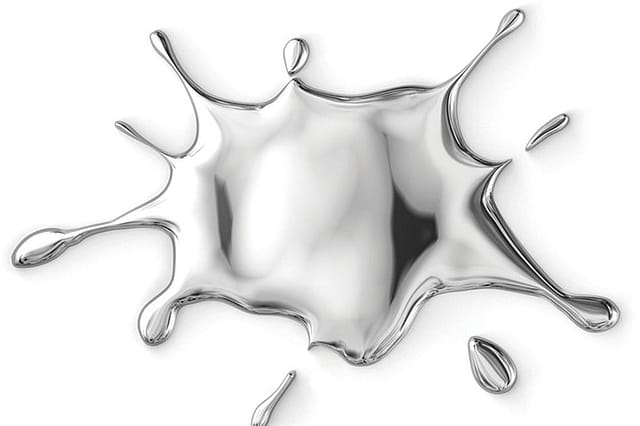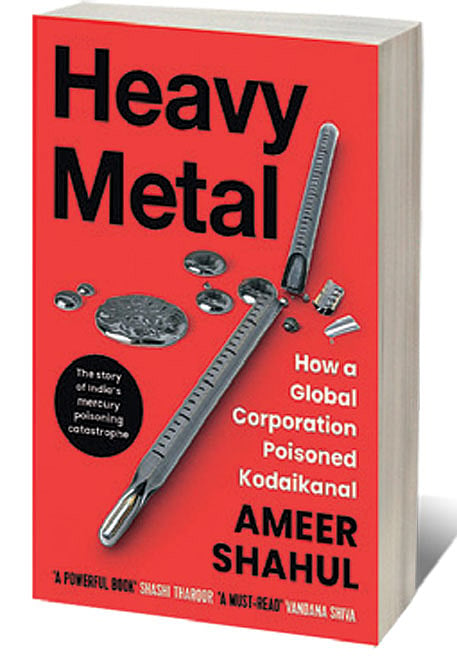Toxic Truths

THOSE WHO REMEMBER the periodic table from school know that mercury is denoted as Hg. The element has a few unique properties as a heavy metal and stays liquid at ‘standard temperature and pressure’. The title Heavy Metal, therefore, is fitting, and the story that Ameer Shahul tells, an outcome of rigorous investigative journalism, is about people who turned Kodaikanal, Tamil Nadu, the ‘princess of hill stations,’ into their profit-acceleration turf. In return, they contaminated its water bodies, which caused serious ailments, from kidney damage to cancers, among its employees and residents, besides endangering the health of future generations.
Shahul, a former journalist who has worked with national and international media groups, has also helmed public affairs roles at MNCs, ranging from Greenpeace to IBM. For long, he has silently enjoyed a hawk-eyed view of the goings-on in big corporations, how they do their business in India and get away with impunity. In his new avatar as an author, he is making an appearance also as a whistle-blower, apart from being an expert on how avaricious corporations set up shop in forlorn spots, far from their own country where clearance and regulatory frameworks are stringent, only to exploit their newfound untouchability to the fullest.
Shahul notably dwells on extraneous factors and geopolitics that drive global businesses in search of avenues to maximise their profits at an astronomical scale while at the same time paying only lip service to accountability and safety requirements in developing countries.
In this case, how did Unilever end up in Kodaikanal with a thermometer manufacturing company that was, however, registered as a glass manufacturing unit, a neat ruse to circumvent hazardous waste management regulations? What happened until the mid-2010s when its role in environmental pollution snowballed into a global controversy and Unilever had to shut its operations?
The book digs deep, and, of course, digs up, along with the history of mergers and acquisitions and treasure hunts, a lot of toxic dirt. It is also a story about how capitalism, despite all its finesse and pelf, zealously values profit over human life, especially in less developed regions of the world.
Openomics 2026: Continuity and Conviction
06 Feb 2026 - Vol 04 | Issue 57
The performance state at its peak
The book starts with an ‘indignant’ letter shot off in 2015 by a group of 50 awardees of the Goldman Environmental Prize, also known as Green Nobel, to the then CEO of Unilever, Paul Polman, asking him to accept responsibility for the devastation of Kodaikanal and the mercury-related ailments of thousands of its resident since the 1980s. The author then narrates the story, filled with rich anecdotes and fresh inputs, about Unilever’s destruction of Kodaikanal’s fragile ecosystem, known locally as Pambar Shola, which he argues is similar in many ways to the Amazon forests in Brazil, Borneo in Southeast Asia and Madagascar in Africa—as home to endangered and nearly extinct flora and fauna.
The book tracks pressures back at home in Watertown, Massachusetts, over toxic waste and the geopolitical churning following the Iranian Revolution of 1979. The inflation it caused ate into the toplines and bottom lines of many American companies, propelling them to look for fresh pastures. That was how Chesebrough-Ponds shifted base from Watertown to Kodaikanal to re-start a mercury thermometer making facility around 1983. Towards the end of the 1980s, they sold the company to Unilever, which operated under its own Indian subsidiary.
The extent of Shahul’s research is conspicuous. The people he interviewed for the purpose include victims, environmentalists, and conservationists of the repute of Navroz Mody, who for years had unstinting faith in the safety measures that MNCs typically had in place. Of course, Mody changed his mind later.
Full of revelations, this book spares none, including Unilever’s Indian unit. Heavy Metal can also be used as a manual by imaginative eco-warriors and policymakers to sense the danger of looming environmental disasters in advance. It holds a mirror to the mistakes of omission and commission that India often makes in reviewing MNC projects. That it took Unilever more than 15 years—of campaigns after its wrongdoing came to the fore—to compensate affected workers is a reminder of the humongous costs of such mistakes. This is, therefore, an essential read.

